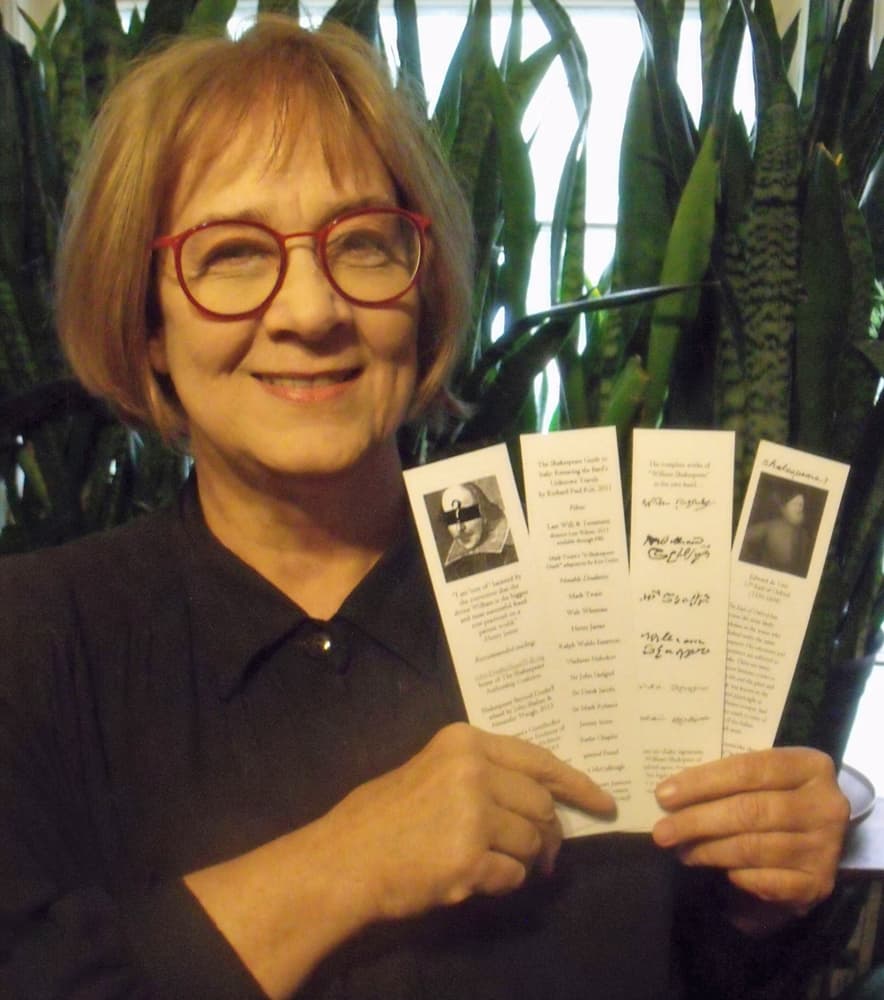Cynthia Moore: How I Became an Oxfordian
August 27, 2020

I have always enjoyed seeing performances of Shakespeare’s plays and wish I could find excuses to use more of his beautiful phrases. I hadn’t given much thought to the authorship question though I had a few episodes of uncertainty. On my early “pilgrimage” to Stratford I had a visceral reaction to that ugly bust in the church — this couldn’t be right! When I read a biography of the life of “Shakespeare” (meaning William Shakspere of Stratford-upon-Avon), I thought it should be titled, say, Shakespeare’s England, as there was precious little about the man himself. Then there were Mr. Shakspere’s six shaky signatures — they just didn’t make sense, so I averted my eyes and tried not to think about them.
In 1989 the PBS Frontline show “The Shakespeare Mystery” opened my eyes to a new world. The arguments against the Stratford man and for Edward de Vere, 17th Earl of Oxford, seemed quite credible. I immediately read Charlton Ogburn’s The Mysterious William Shakespeare, which was very convincing, and read other orthodox biographies with my eyes wide open to see all the equivocal statements, the circular reasoning, the outright fabrications. I kept reading any available material and soon became a convinced Oxfordian. Now the ugly bust, the bereft biographies, and the shaky signatures all made sense — it was not the right man!
If one had the scales of justice and placed all the things that connect Oxford to the works on one side and the very little that connects Mr. Shakspere to them, the balance would certainly tilt to Oxford. Among the many connections are the Hamlet characters Rosencrantz and Guildenstern. One can see how they would have appeared in a play by Oxford through his brother-in-law’s letter mentioning that he’d met courtiers by those names in Denmark. The Stratford man? How would he have come up with those particular names? Rosencrantz and Guildenstern may be dead but they are helping to hammer the nails into the Stratford man’s coffin.
As an artist I feel it is important for the right person to get credit for their work. As an educator I tell my students that creativity involves not only imagination but learning, experience, and hard work. Oxford’s life and work are a great example of that process.
I signed the “Declaration of Reasonable Doubt” and joined the Shakespeare Oxford Fellowship. The “Doubt About Will” website and the SOF have made it easier to introduce people to the issue. The list of notable doubters has given me fortitude.
I designed bookmarks that list notable doubters and reading material doubting the Stratford man and supporting Oxford. I hand these out to friends, acquaintances, and playgoers, or leave on library and coffee shop tables. When I tell people I’m an Oxfordian, instead of rolled eyes or polite rejection, the response more often is curious interest and one time, “Oh, I am too!”
The evidence for Oxford seems to fit like a glove: not so for the glove-maker’s son.
— Cynthia Moore
“How I Became an Oxfordian” is a series edited by Bob Meyers. You may submit your essay on this topic (500 words or less in an editable format such as MS Word), along with a digital photo of yourself, to: communications@shakespeareoxfordfellowship.org. Also include a sentence about yourself, e.g.: “John Smith is a business owner in Dallas.” You must be an SOF member to submit an essay.
To join the SOF see our membership page. To read other essays in this series, click here.
Membership dues cover only a fraction of our budget, including all our research, preservation and programming. Please support the SOF by making a gift today!
Blue Boar Tavern: Wassail Q&A
Tuesday Dec. 17, 8pm E / 5pm P
Sign up below for event invites!
